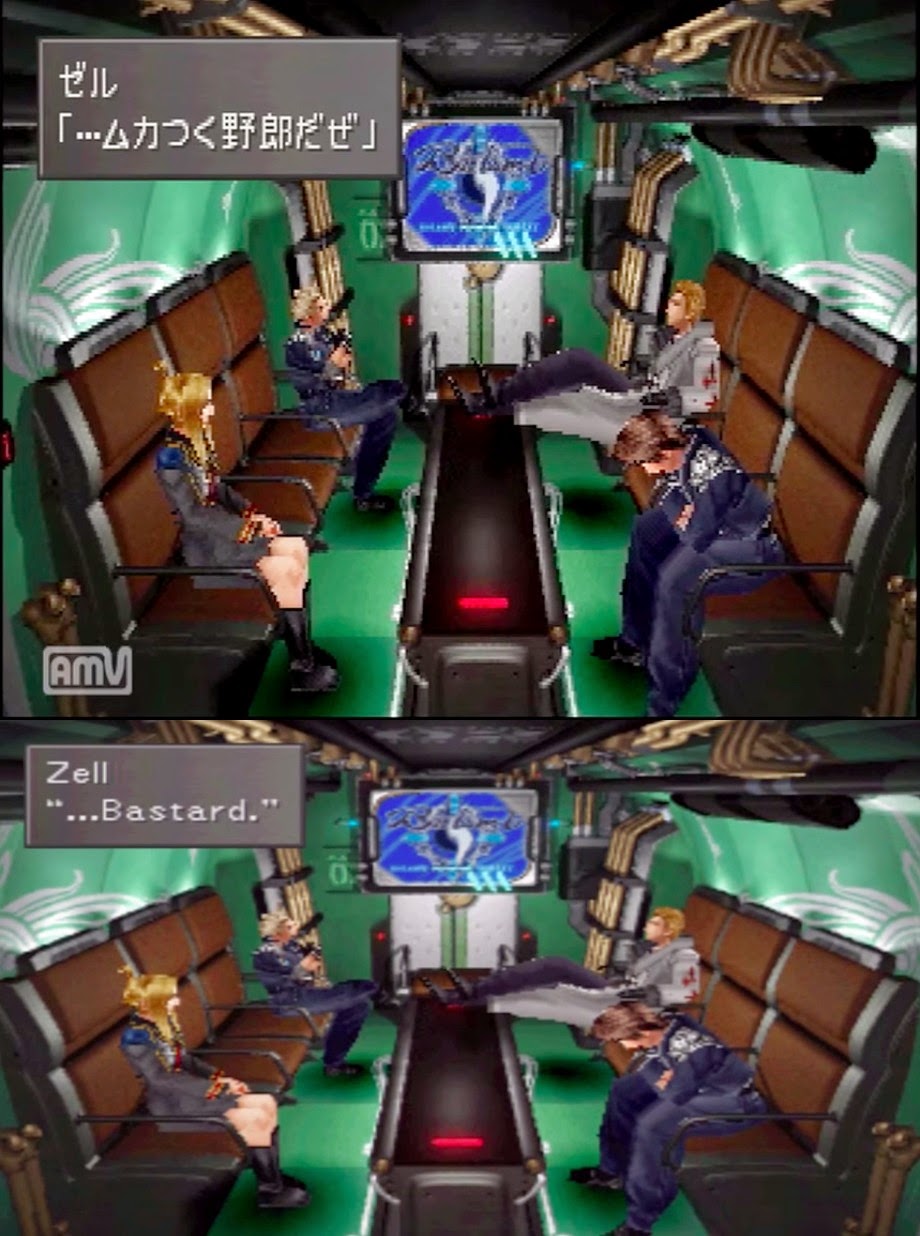This is an entry in a series of posts looking at the localisation of the beginning segment of the game, Final Fantasy VIII. You can find the first post here. Thanks for reading!
| Japanese | English | |
|---|---|---|
| Zell 1 |
…ムカつく野郎だぜ
|
...Bastard.
|
1. Slang and derogatory terms can be interesting to translate as they are often impossible to literally translate. Here, what ended up as, "Bastard" stemmed from the Japanese verb mukatsuku (むかつく), which means "to feel angry or sick", and yarou (野郎), which is a derogatory way to refer to a male. I think "bastard" is a great translation here, but what I wonder about is whether the translator had to first get clearance to use this swear word. All games have age-ratings, and I imagine this imposes a limit on the degree of foul language deemed acceptable to use. If there was a limitation on swear words, this part could easily be translated as, "...Dick." (Perhaps my British heritage shows with that choice of words...).
| Japanese | English | |
|---|---|---|
| Quistis 2 |
さあ、B班受け持ち地域は【中央広場】よ!かならず、戦闘前にG.F.の装備を確認してから行くように! | Ok, you are to secure the [Central Square]! Be sure to equip your GF before you head into battle! |
2. Quistis' orders contain a slightly different slant in Japanese; she simply says squad B's responsibility is the central square, rather than specifically mentioning securing it. I suppose this is implied though. Similarly, in this scene she is directly talking to the squad B members, so I understand why the way she addresses them was changed to, "you." In the next sentence, she only reminds the squad to check their GF, rather than explicitly advising the squad to equip them. If translated literally, it could read, "Okay, squad B, you're to take care of the [Central Square]. Be sure to check your GF junctions before heading into the battle." Equipping a GF is central to the battle system, so I have no problem with the translation making Quistis' advice more direct. Finally, the line of dialogue highlights how the Japanese uses periods between the acronym for Guardian Force, but this is ditched in the English version. I think this is the right choice, most acronyms nowadays are not broken up with periods.
| Japanese | English | |
|---|---|---|
| Seifer
3
|
この先が【中央広場】だ。おい!ガルバディアの臆病者!コソコソしないで出てこい!俺を退屈させるな!
|
The [Central Square] is up ahead. Hey! All you Galbadian cowards out there! Come out'n show your faces! Don't leave me hangin' now!
|
3. Seifer's last two sentences are slightly different in Japanese. In the penultimate sentence, he demands that the soldiers stop sneaking around and come out and show their faces. The English lacks that first part. Then in the final sentence, he demands the soldiers not to bore him/make him bored. I suppose "Don't leave me hangin' now" conveys this sentiment, but to my mind it doesn't seem like a particularly natural expression. Using the existing translation as a base, I offer an alternative of, "Stop sneaking around out there! Come out and show your faces! Gimme some excitement!" It's clear that Seifer doesn't want to be bored, so I think a demand for excitement conveys the same sentiment and seems more natural than something like, "Don't bore me to death."
| Japanese | English | |
|---|---|---|
| Squall
4
| まだ敵がいそうだな…… |
There may be more...
|
| Seifer 5 |
じゃ、近くに敵がいないか見てきてもらおうか
|
All right, I want you guys to scout the area for enemies.
|
4. The nuance is slightly different between the two languages. In Japanese, Squall says, "It seems that there are still more enemies." The English however has a different slant. The Japanese implies that Squall senses there seems to be more enemies, whereas the English is less committal. I must add that the fact that I picked up on such a small detail is a credit to how well the overall translation sticks to the original Japanese.
5. Similar to the last point, I think the translation here changes enough of the details to make it bear mentioning. The Japanese reads, "All right, can you go see if there any enemies nearby?" The English seems slight more demanding, and also ups the sense of Seifer giving a proper military squad command. In contrast, the Japanese seems much more casual. Once again, this translation differs only very slightly from the Japanese, but to an extent that I think it deserves to be briefly mentioned.
Thanks for reading! I'd love to hear your thoughts on the above points or Final Fantasy VIII's localisation as a whole, so please comment if you've got something to say.
If you enjoyed this post, I bet you'll like the next post in this series:
http://www.localireview.com/2015/04/final-fantasy-viii-localisation-review-4.html
http://www.localireview.com/2015/04/final-fantasy-viii-localisation-review-4.html








0 comments:
Post a Comment